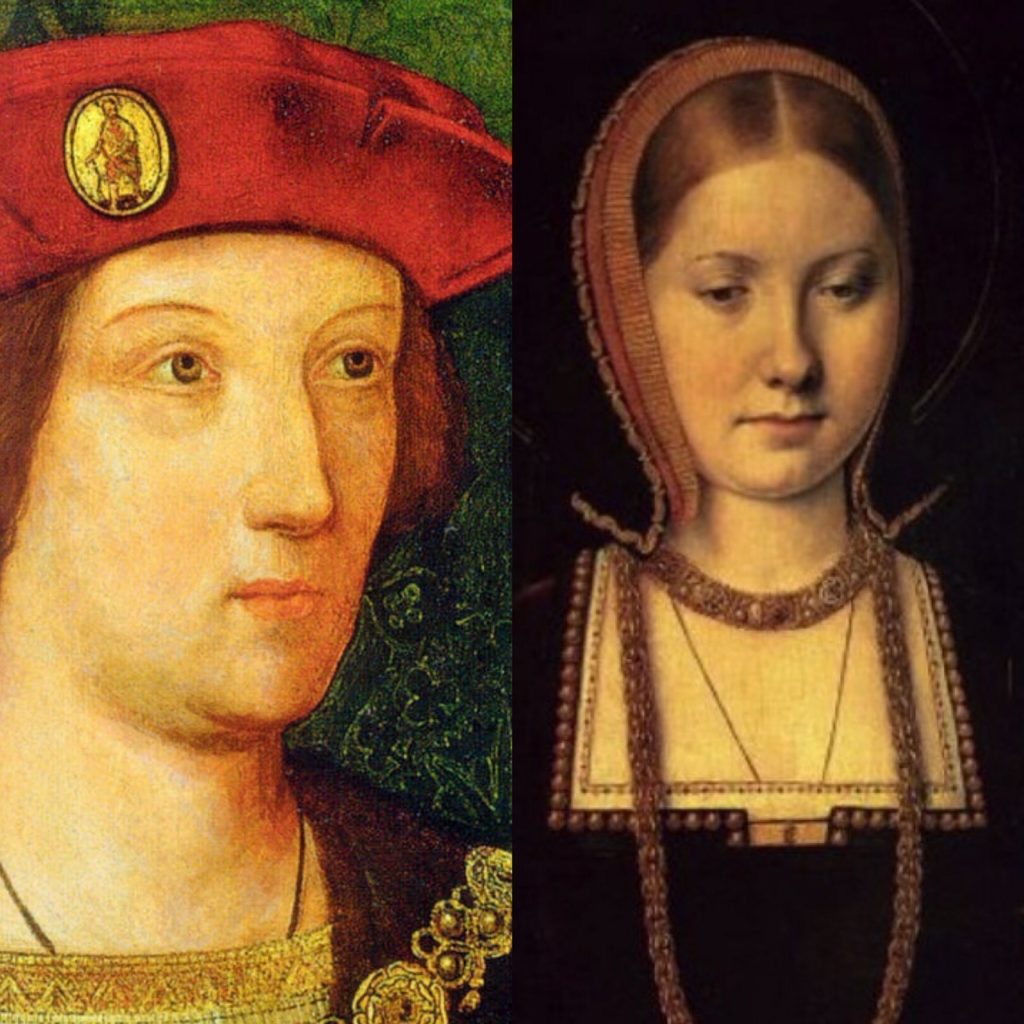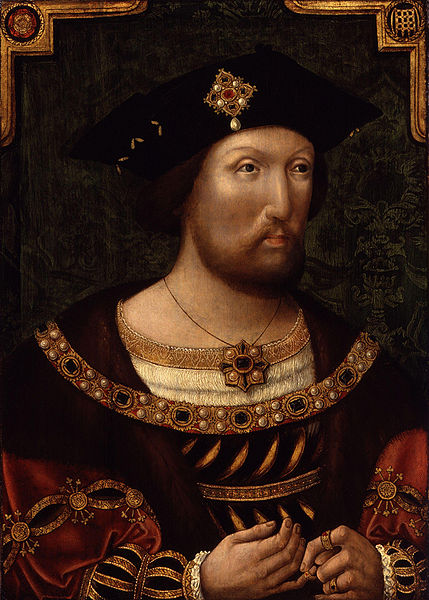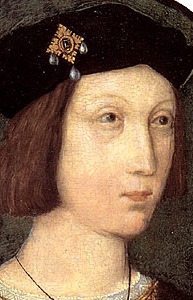
We Royal History Geeks are a nosy bunch, aren’t we? Normally, what happens between a couple on their wedding night stays pretty private. Even a close friend might think twice before prying into the details.
For Katherine of Aragon and Arthur, Prince of Wales, however, no such privacy can be afforded. The subject of whether their teenage marriage was consummated would emerge at the centre of King Henry VIII’s great matter – his attempt to divorce his first wife and be wed to Anne Boleyn.
Arthur was Henry’s older brother. As Arthur’s widow, Katherine was technically Henry’s sister under church law. But the Pope had dispensed with this obstacle – as Popes often did. The couple was free to marry.
But an anxious Henry later grew doubtful of the Pope’s right to wave away this important consideration. The book of Leviticus declared that if a man took his brother’s wife he would be childless. Given his lack of son, these words struck a chord with the King. What right did the church have to overturn scripture?
Katherine and her supporters argued that the Pope’s dispensation was largely unnecessary. She swore that her marriage to Henry’s brother had never been consummated. Katherine and Arthur had never truly been husband and wife. Yet Henry grew convinced that his wife had not been a maid when she came to him. Neither was prepared to back down.
We will never know the truth. Only two people know for sure what happened during that short marriage. They have both been dead for half a millennium. But if I were a betting man, my money would be on Katherine. Here’s six reasons why.
1.Katherine stood fast even as she prepared to meet her maker
Religious belief was paramount in Tudor England. That doesn’t mean we should ascribe spiritual purity to everyone indiscriminately. But Katherine was a devout woman and she swore that she and Arthur had never been truly man and wife. She maintained this stance until the end of her days – right up to the point when she was going to meet her maker. If fear of judgement did not cause her to confess, she likely had nothing to retract.

2. Henry’s concerns were suspect and hypocritical
I’m one of the few who thinks some of Henry’s concerns about his marriage were genuine. He probably doubted his marriage to Katherine before Anne Boleyn came along.
Nevertheless, Henry was a hypocrite. He argued that Katherine and Arthur had become one, making Katherine his sister under canon law and their marriage incestuous. The Pope, he said, was wrong to grant dispensations in such circumstances. Yet, at the same time, Henry was applying to the Pope for dispensation to marry Anne Boleyn. She was in the same forbidden degree of affinity to him as Katherine was. Henry had slept with her sister, Mary.
There must have been limits to how far Henry’s marriage to Katherine was genuinely plaguing his conscience.
3. Katherine publicly challenged Henry to admit he knew the truth
At a trial to determine the legality of her wedding, Katherine gave the performance of a lifetime. Kneeling before Henry, she delivered an impassioned defence of their union. Included within this monologue was the following pointed phrase:
“And when ye had me at the first, I take God to be my judge, I was a true maid without touch of man; and whether it be true or no, I put it to your conscience.”
Katherine is implying that Henry knew full well that it was he, not Arthur, that took her virginity. Could there have been physical evidence of such on their wedding night? If Katherine was lying, this was a bold move.
4. Arthur was probably sickly

Some argue that Arthur – who was probably born premature – had always been a sickly lad. There is no real evidence for that.
However, according to testimony by Spanish servants, Arthur was not well at the time he and Katherine married. This could explain a lack of sexual congress. It might also explain why Katherine recovered from illness and why her fragile husband did not.
Clearly this testimony must be treated with caution. These witnesses were speaking at a trial convened in Spain and were saying things that the local authorities wanted to hear. Nevertheless, they were talking about events that took place 30 years before and their accounts fit together well. They would have had little chance to compare notes.
5. Newsflash: teenage boys lie about sex
Henry had witnesses too. Servants of Arthur reported that after his wedding night he had been heard bragging that ‘marriage was thirsty work.’ One servant, Sir Anthony Willoughby, was instructed to bring the young Prince a cup of ale for he had been ‘this night in the midst of Spain.’ The implication was clear. Arthur had sealed the deal.
As with witnesses that spoke up in Katherine’s defence, these men were not impartial. It was in their interest to say things that Henry VIII wanted to hear. But even if their testimony was honest, can we really be confident that Arthur’s youthful brags contained the truth? He would hardly be the only teenage boy in history to brag about a sexual encounter which had, strictly speaking, never happened. Were he ill – and feeling insecure – at the time, might he have felt extra pressure to overcompensate?
6. Teenage sex was not always encouraged in Tudor England
Couples married young. But did they always take things to the next level? We know that Elizabeth or York and Margaret Beaufort intervened to ensure that Arthur’s sister, Princess Margaret was not introduced to sex too earlier in the run up to her marriage to the King of Scots. There’s no suggestion that they did the same for Katherine and Arthur. But it might suggest that there was a hesitance about teenage sex, even following marriage.
Other possible examples can be found. Katherine Parr married a teenage boy when she was young. She did not fall pregnant. This could suggest that sex was delayed. Though he, like Arthur, was probably sickly.
*
Let me repeat: we will never know for sure. I appreciate that there are counterpoints to all these arguments. Perhaps Katherine had falsely convinced herself that nothing happened. Maybe she decided to double done and stick to her guns. The Spanish witnesses could have been lying. Arthur’s brags may have been based on the truth.
Ultimately – and at risk of oversimplification – it comes down to a simple question. Whose honesty do you trust more: Henry VIII or Katherine of Aragon? On this criterion, I am far more minded to give the benefit of the doubt to Katherine the Queen.
Subscribe to our newsletter!
I also believe that Katherine was telling the truth she would not of lied and risked eternal damnation but also she told the truth to the King also I also believe Henry loved Katherine but had to lay blame somewhere for no living son and since he was a king anointed by God he could not be at fault therefore his belief was there was no other reason it had to be Katherine
Katherine Parr (Henry’s sixth wife didn’t marry a teenage boy). She had to undergo arranged marriages to three older men (the third being Henry VIII) and then she married Thomas Seymour (Jane Seymour’s brother). It was Katherine of Aragon who married the teenage Prince Arthur and later Henry
Thanks for your comment.
Historians used to confuse Katherine Parr’s first husband with his grandfather of the same name. There’s now agreement that her first husband was a young – probably sickly – lad.
It is actually irrelevant whether or not Catherine was telling the truth. The whole thing had become a clusterf*ck.
If Catherine was lying she had every reason to lie, the preservation of her daughter. As we know, it can be easy for someone to double down on their lies.
The Spanish servants could be lying, even if Catherine did not have sex with Arthur. They claimed that Arthur was sickly, but they could be lying about that.
The servants of Arthur could be lying even if Arthur did “seal the deal.” Arthur may not have bragged about what he did.
And finally, Henry himself may not have remembered. He had suffered a serious injury that almost certainly damaged his brain, his reputation for nastiness commenced at that time.
Whether or not Catherine was telling the truth is irrelevant. The course was set.
Many thanks for your comment. I agree that we could never know.
Henry’s fall from the horse wasn’t until 1536 and there is no reliable evidence that he suffered any injury from it. I have a piece about that elsewhere on the blog if you’re interested 🙂
@2:00 “she is 6 years younger than him” that would make her 12 yrs old. Did you mean 6 years “older”? She did marry his older brother, Arthur, a few years earlier, when she was 16 and Arthur was 15… probably just a minor mistake, but it did confuse me when I was crunching the numbers. Great video nonetheless. Thanks for the thorough research.
Yep. If you check the notes on the video I point out that I made these mistakes 🙂